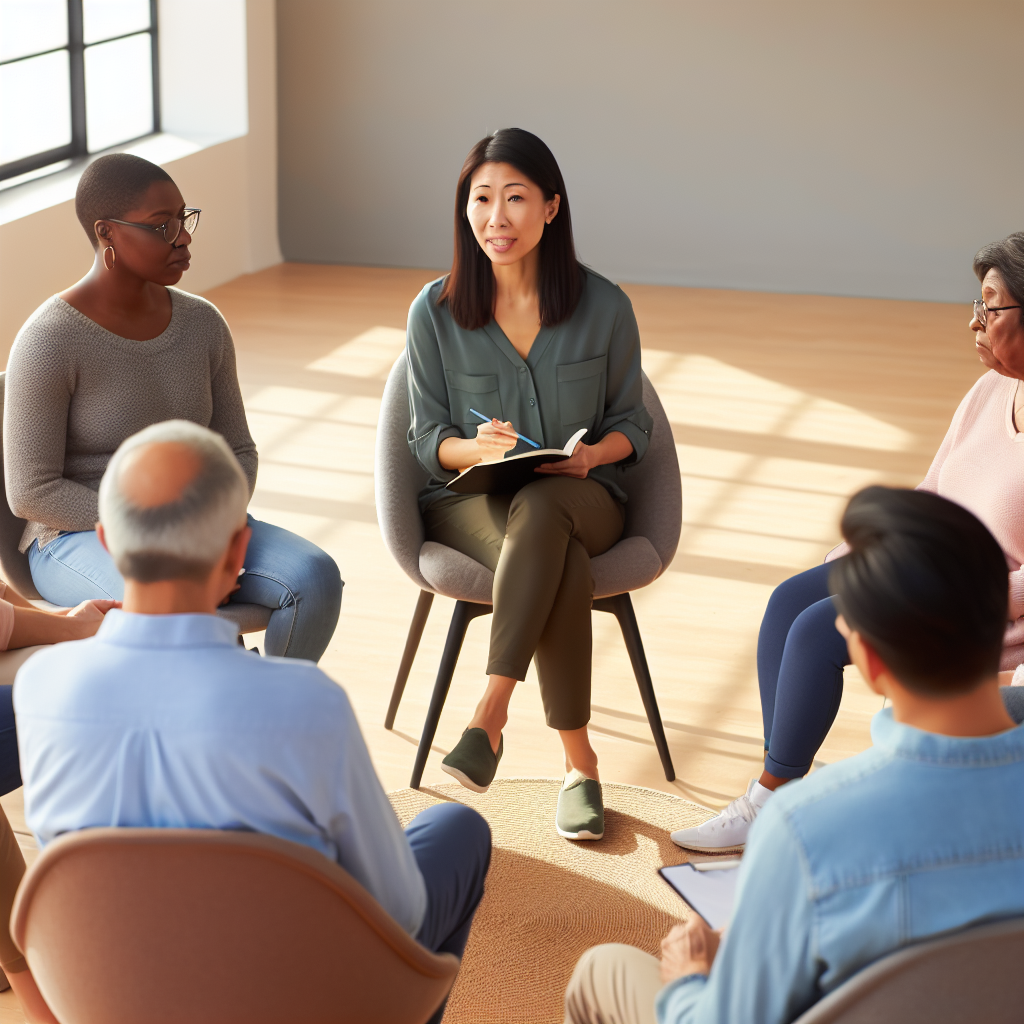Introduction
Group therapy for addiction involves a small group of individuals meeting regularly to support each other in their journey towards recovery.
This approach provides a sense of community and belonging, which is crucial for individuals struggling with addiction.
Effective group therapy techniques are essential in creating a safe and supportive environment for participants to share their experiences.
Participants can receive feedback and learn from one another.
These techniques help foster trust, communication, and connection among group members.
The benefits of group therapy in addiction recovery are numerous.
Not only does it offer a sense of camaraderie and understanding, but it also provides individuals with the opportunity to gain insights into their own behaviors and triggers.
Additionally, group therapy can help participants develop new coping skills and strategies for managing cravings and stressors.
Establishing Trust and Safety in the Group Setting
When conducting group therapy for addiction, one of the critical aspects is establishing trust and safety within the group setting.
Participants need to feel secure and comfortable sharing their experiences, thoughts, and feelings without fear of judgment or breach of confidentiality.
Creating a safe and supportive environment involves setting ground rules that promote respect, empathy, and understanding among group members.
It is essential to encourage open communication and honesty by fostering a non-judgmental atmosphere where individuals feel heard and validated.
Discussing confidentiality guidelines is crucial in building trust within the group.
Participants must understand that what is shared in the group stays within the group unless there is a risk of harm to oneself or others.
Emphasizing the importance of confidentiality helps create a safe space for vulnerability and personal growth.
Establishing trust and safety in the group setting is a continuous process that requires ongoing reinforcement and maintenance.
Group leaders play a vital role in setting the tone for the group and modeling behavior that fosters trust and openness.
By prioritizing trust and safety, participants can feel supported in their journey towards recovery and healing.
- Create a safe and supportive environment for participants.
- Encourage open communication and honesty.
- Discuss confidentiality guidelines.
Setting Clear Goals and Objectives
Setting clear goals and objectives is essential in group therapy for addiction.
It provides a roadmap for both the facilitator and participants to follow.
Transform Your Career Today
Unlock a personalized career strategy that drives real results. Get tailored advice and a roadmap designed just for you.
Start NowThis ensures that the sessions are focused and effective.
Here are some key points to consider when setting goals and objectives:
- Define the purpose of the group therapy sessions
- Develop specific goals for each participant
- Monitor progress and adjust goals as needed
Before starting the therapy sessions, it is essential to clearly define the purpose of the group.
This could be to provide support, enhance coping skills, or promote relapse prevention.
Having a clear purpose will help guide the direction of the sessions.
Define the purpose of the group therapy sessions
Each participant in the group will have unique needs and challenges.
So it is important to develop individualized goals for them.
These goals should be specific, achievable, and measurable.
For example, a goal could be to abstain from substance use for a certain period or to improve communication skills.
Develop specific goals for each participant
Throughout the group therapy sessions, it is crucial to monitor the progress of each participant towards their goals.
This could involve regular check-ins, assessments, or feedback from both the facilitator and participants.
If a goal is not being met or needs to be adjusted, it is important to address this promptly.
Revise the goal as needed.
Monitor progress and adjust goals as needed
By setting clear goals and objectives in group therapy for addiction, participants can stay motivated.
They can stay focused and engaged in the recovery process.
This also helps the facilitator track progress and make necessary adjustments.
Ensuring the best possible outcomes for all involved.
Uncover the Details: Navigating Housing Policies and Regulations
Utilizing Evidence-Based Therapeutic Techniques
Group therapy for addiction can be significantly more effective when evidence-based therapeutic techniques are utilized.
Showcase Your Business Today
Reach thousands of readers actively exploring professional services. Publish your business profile and grow your audience now.
Publish NowThese techniques have been researched and proven to be beneficial in treating addiction.
Here are some key strategies:
Incorporate Cognitive-Behavioral Therapy Strategies
Cognitive-behavioral therapy (CBT) is a widely recognized form of therapy that helps individuals identify and change negative thought patterns and behaviors.
When applied in a group setting, CBT can help members understand the connection between their thoughts, feelings, and addictive behaviors.
Group members can learn to challenge their distorted beliefs and develop healthier coping mechanisms to prevent relapse.
Introduce Mindfulness and Relaxation Techniques
Mindfulness and relaxation techniques are valuable tools for managing stress, anxiety, and cravings associated with addiction.
Group therapy sessions can incorporate mindfulness exercises, deep breathing, and progressive muscle relaxation to help members stay present and cope with difficult emotions.
These techniques promote self-awareness and emotional regulation, which are essential skills for individuals in recovery.
Use Motivational Interviewing to Enhance Motivation for Change
Motivational interviewing is a client-centered approach that helps individuals explore their ambivalence towards change and strengthen their motivation to make positive changes in their lives.
In group therapy, this technique can be used to facilitate discussions about personal goals, values, and motivations for recovery.
By encouraging group members to articulate their reasons for change, therapists can help cultivate a sense of ownership and commitment to the recovery process.
Incorporating evidence-based therapeutic techniques in group therapy for addiction can enhance the overall effectiveness of treatment.
By utilizing approaches such as cognitive-behavioral therapy, mindfulness, relaxation techniques, and motivational interviewing, group therapists can create a supportive environment that empowers individuals to overcome addiction and achieve lasting recovery.
Uncover the Details: Job Market Trends for Rehabilitation Counselors
Peer Support and Accountability in Group Therapy
Peer support and accountability are essential components of effective group therapy techniques for addiction.
By fostering a sense of camaraderie among group members, promoting peer feedback and support, and holding members accountable for their actions and progress, the therapy sessions can be more impactful and successful.
Fostering a Sense of Camaraderie
- Create a welcoming and inclusive environment where group members feel comfortable sharing their experiences.
- Encourage bonding activities such as team-building exercises or group outings to strengthen relationships.
- Facilitate open communication and active listening to build trust and understanding among group members.
Promoting Peer Feedback and Support
- Encourage group members to provide constructive feedback and support to each other during therapy sessions.
- Promote a culture of empathy, compassion, and encouragement within the group to foster a positive atmosphere.
- Highlight the importance of active participation and engagement in supporting fellow members on their recovery journey.
Holding Members Accountable
- Set clear expectations and goals for group members to work towards during the therapy sessions.
- Establish regular check-ins and progress reviews to monitor each member’s development and address any challenges or setbacks.
- Encourage self-reflection and personal responsibility among group members to take ownership of their actions and decisions.
Encouraging peer support and accountability in group therapy for addiction can create a powerful sense of community, motivation, and progress.
By working together towards common goals and holding each other responsible, group members can support one another in overcoming their addiction and achieving lasting recovery.
You Might Also Like: The Impact of Family Support Workers in Educational Settings

Implementing Structured Activities and Exercises
- Plan engaging and interactive activities
- Use role-playing exercises to practice coping skills
- Incorporate group discussions and sharing sessions
Group therapy for addiction is most effective when structured activities and exercises are incorporated into the sessions.
These activities not only keep the group engaged but also provide opportunities for learning and practicing important coping skills.
Engaging and Interactive Activities
When planning structured activities for group therapy, it is important to consider the interests and preferences of the participants.
Engaging activities can include art therapy, music therapy, or guided meditation.
These activities can help reduce stress and anxiety levels in the group members and promote relaxation.
Role-Playing Exercises for Coping Skills
Role-playing exercises are an effective way for group members to practice and improve their coping skills in a safe and supportive environment.
By simulating real-life scenarios, participants can learn how to handle triggers and cravings while receiving feedback from their peers and therapist.
Group Discussions and Sharing Sessions
Group discussions and sharing sessions allow participants to express their thoughts, feelings, and experiences in a supportive group setting.
This can help members feel validated, understood, and connected to others who are going through similar challenges.
It also provides an opportunity for peer support and feedback, which can be invaluable in the recovery process.
Find Out More: Rehabilitation Counseling: Setting Realistic Goals
Treatment Techniques for Addiction in Group Therapy
When treating addiction through group therapy, it is crucial to address co-occurring disorders and underlying issues that may contribute to the substance abuse.
Here are some effective techniques for handling these complex aspects:
Identify and Address Co-occurring Mental Health Disorders
Many individuals struggling with addiction also suffer from co-occurring mental health disorders such as depression, anxiety, PTSD, or bipolar disorder.
It is essential to identify these conditions early on and address them simultaneously with the addiction treatment.
- Conduct thorough assessments to screen for any underlying mental health issues.
- Collaborate with mental health professionals to provide comprehensive care.
- Offer individual therapy sessions in addition to group therapy for personalized treatment.
Explore Underlying Issues Contributing to Addiction
Addiction is often a symptom of deeper underlying issues such as trauma, unresolved emotional pain, family dynamics, or stress.
By exploring and addressing these root causes, individuals can better understand their addictive behaviors and work towards lasting recovery.
- Encourage open and honest communication within the group to explore personal histories.
- Use evidence-based therapies like cognitive-behavioral therapy (CBT) to address negative thought patterns and behaviors.
- Integrate mindfulness practices to help individuals cope with triggers and cravings.
Provide Specialized Care for Dual Diagnosis Patients
Individuals with a dual diagnosis, meaning they have both a substance use disorder and a mental health disorder, require specialized care that addresses both aspects simultaneously.
Here are some strategies for effectively treating dual diagnosis patients:
- Coordinate care between addiction specialists and mental health professionals to create an integrated treatment plan.
- Implement a holistic approach that addresses the physical, emotional, and psychological aspects of recovery.
- Educate group members about the connection between mental health and addiction to reduce stigma and increase understanding.
By addressing co-occurring disorders and underlying issues in group therapy, individuals can receive comprehensive care that helps them overcome addiction and achieve long-term sobriety.
Showcase Your Business Today
Reach thousands of readers actively exploring professional services. Publish your business profile and grow your audience now.
Publish NowEffective Group Therapy Techniques for Addiction Recovery
Effective group therapy techniques for addiction are crucial in fostering recovery.
By promoting a sense of community and support, group therapy can provide individuals struggling with addiction a safe space to share their experiences and learn coping mechanisms.
Throughout this blog post, we have explored various strategies such as cognitive-behavioral therapy, motivational interviewing, and relapse prevention.
These techniques aim to address the underlying issues contributing to addiction and empower individuals to make positive changes in their lives.
It is evident that group therapy offers a unique opportunity for individuals to connect with others who are facing similar challenges.
By creating a supportive environment, group therapy can help individuals feel understood, validated, and motivated to stay on the path to recovery.
Therefore, it is essential to recognize the significance of effective group therapy techniques in addiction recovery.
If you or someone you know is struggling with addiction, consider joining a group therapy program to receive the support and guidance needed to overcome obstacles and achieve lasting sobriety.
Take the first step towards recovery by embracing the power of group therapy and embarking on a journey towards healing and transformation.
Remember, you are not alone, and together, we can overcome addiction and build a healthier, fulfilling future.
Additional Resources
Principles of Drug Addiction Treatment: A Research-Based Guide …
What is Human Services – National Organization for Human Services
[E-Books for Sale]
The Big Book of 500 High-Paying Jobs in America: Unlock Your Earning Potential
$19.99 • 500 High-Paying Jobs • 330 pages
Explore 500 high-paying jobs in America and learn how to boost your career, earn more, and achieve success!
See All 500 High-Paying Jobs of this E-Book
1001 Professions Without a Degree: High-Paying American Jobs You Can Start Now
$19.99 • 1001 Professions Without a Degree • 174 pages
Discover 1001 high-paying jobs without a degree! Unlock career tips, skills, and success strategies for just $19.99!




